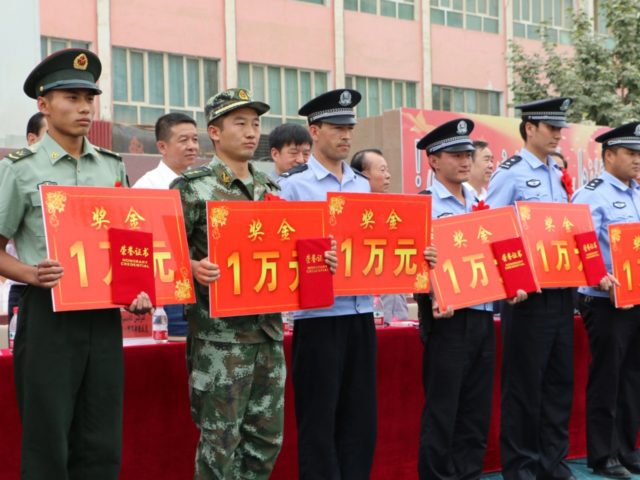China’s Global Times state newspaper suggested on Monday that the American government use its policies in Xinjiang – where the Communist Party has built hundreds of concentration camps for Muslim ethnic minorities – as a “reference” in fighting terrorism at home.
Xinjiang is home to the majority of the nation’s ethnic Uyghur minority. The concentration camps, believed to number upwards of 1,000 and be holding up to 3 million people, contain mostly Uyghur prisoners, but also Kazakh, Kyrgyz, and other ethnic minorities. Reports suggest that some Christians and other enemies of the Communist Party are also languishing in the camps.
Survivors of the camps – most either Kazakhs who appealed to Kazakhstan to help them out or Uyghurs married to foreign citizens who petitioned for their escape – say that Chinese Communist Party officials kill, rape, torture, and enslave people inside. Most are forced to memorize Party songs and worship the Party leader, Xi Jinping, as well as learn Mandarin and eat pork as a way of renouncing Islam. Women survivors say they have seen girls and women taken away for organ harvesting and gang rape.
China calls these torture camps “vocational centers” where Uyghurs and others learn “job skills.”
Global Times writer Mu Lu suggested on Monday that Washington consider implementing a concentration camp policy to prevent another September 11-style jihadist attack. The writer argued that America has failed to “have eradicated the soil that breeds terrorism.”
In Xinjiang, Communist Party officials are leveling Uyghur cemeteries and destroying bodies buried there, leaving scraps of bone among the rubble unceremoniously. Mu did not specify that America should do the same with its Muslim cemeteries, only that it use Chinese policies as a “reference.”
“Will 9/11-style terrorist attacks take place again on the continental United States?” Mu asked. “Counter-terrorism is still one of the toughest challenges the US faces.”
“China has taken action to explore measures to deal with the threat of terrorism it has been facing. China has found its key, which has proven to be effective,” Mu claimed, referring to the gross human rights abuses in Xinjiang, or East Turkestan. “The past three years have not seen any terrorist attacks in Xinjiang. On the contrary, Afghanistan and India, which are China’s close neighbors, have experienced 1,776 and 888 terrorist attacks in 2018, respectively, which caused more than 10,000 deaths.”
“We won’t force other countries to follow the footsteps of China, although what we are doing has something in common with what Americans hope for. If Washington really cares about its people’s safety, it should find a more feasible way of counter-terrorism. China’s measures can be a good reference,” the article continued.
Mu also accused American politicians like Secretary of State Mike Pompeo of leaving “the door open for terrorist attacks” by condemning the atrocities committed against Uyghurs.
The Global Times column appears to be the first time that the Chinese regime directly suggests America should consider the “vocational centers” as an answer to terrorism, but not the first time the regime has attempted to court the rest of the world with the idea. State media has suggested that Pakistan, often cited as home to the largest concentration of jihadist groups in the world, also put Muslims in concentration camps. As an Islamic state, adopting such a measure would be unlikely, though Prime Minister Imran Khan has embraced other Chinese human rights abuses such as the purge of hundreds of communist officials considered disloyal to Xi Jinping under dubious “corruption” charges.
China has repeatedly condemned American officials and human rights activists for challenging the atrocities in Xinjiang.
“Since the beginning of this year, some Western media and politicians have been viciously attacking actions adopted by Xinjiang to help those affected by extremism to return to their families and society through educational transformation,” a state media article alleged a year ago. “Radical Western politicians and media have set off a wave of anti-China rhetoric and Xinjiang has become their new target.”
Since the publication of that article, reports have estimated that China has built as many as 1,200 concentration camps in Xinjiang. Survivors say they experienced rape, enslavement, brutal torture, and crimes of genocide like forced sterilization, intended to end the reproduction of undesirable ethnic groups. Some who have escaped say that doctors at the camps have scanned their full bodies to assess the health of their organs; China has for years carved the organs of political prisoners out while alive, without anesthesia, to sell on the black market.
The Chinese Foreign Ministry has repeatedly defended the camps as a way to keep Uyghurs from what communist Han Chinese believe are natural tendencies towards jihad.
“By lawfully establishing those centers, the local government in Xinjiang aims to save the people who are deceived by or even have joined terrorist forces and committed minor offenses to help them get rid of extremist ideologies,” Foreign Ministry spokewoman Hua Chunying said in September. “These measures are no different in nature from the de-radicalization and preventive counter-terrorism measures taken by many other countries.”

COMMENTS
Please let us know if you're having issues with commenting.